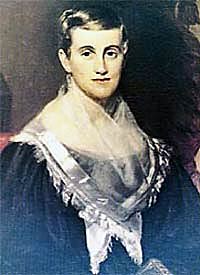Readings:
Psalm 86:11-17
Habakkuk 3:16-19
Acts 24:10-21
Luke 9:62–10:2Preface of a Saint (2)
PRAYER (traditional language)
God, the wellspring of justice and strength: We thank thee for raising up in Prudence Crandall a belief in education and a resolute will to teach girls of every color and race, that alongside her they might take their place in working for the nurture and well-being of all society, undaunted by prejudice or adversity. Grant that we, following her example, may participate in the work of building up the human family in Christ, thy Word and Wisdom; who with thee and the Holy Spirit livest and reignest, one God, now and for ever. Amen.
PRAYER (contemporary language)
God, the wellspring of justice and strength: We thank you for raising up in Prudence Crandall a belief in education and a resolute will to teach girls of every color and race, that alongside her they might take their place in working for the nurture and well-being of all society, undaunted by prejudice or adversity. Grant that we, following her example, may participate in the work of building up the human family in Christ, your Word and Wisdom; who with you and the Holy Spirit lives and reigns, one God, now and for ever. Amen.
This commemoration was approved provisionally at General Convention, 2009
Return to Lectionary Home Page
Webmaster: Charles Wohlers
Last updated: 7 July 2012
PRUDENCE CRANDALL
TEACHER AND PROPHETIC WITNESS, 3 Sept. 1890
 Prudence Crandall, (September 3, 1803-1890) a schoolteacher raised as a Quaker, stirred controversy with her education of African-American girls in Canterbury, Connecticut. Her private school opened in January 1832, but was boycotted when she admitted a 20-year old African-American female student in the autumn of 1833, creating what is generally regarded as the first integrated classroom in the United States. Parents of the white children mostly withdrew their daughters, leading Crandall to found a school for "Young ladies and Misses of color".
Prudence Crandall, (September 3, 1803-1890) a schoolteacher raised as a Quaker, stirred controversy with her education of African-American girls in Canterbury, Connecticut. Her private school opened in January 1832, but was boycotted when she admitted a 20-year old African-American female student in the autumn of 1833, creating what is generally regarded as the first integrated classroom in the United States. Parents of the white children mostly withdrew their daughters, leading Crandall to found a school for "Young ladies and Misses of color".
Crandall endured violent opposition to her school, both locally in Canterbury and at the State level. Laws were passed against it, the well was poisoned, windows were smashed, and finally the school was burned down, forcing it to close.
Connecticut repealed the Black Law in 1838, and later recognized Prudence Crandall with an act of the state legislature, prominently supported by Mark Twain, providing her with a $400 yearly pension in 1886 (about $9600 in 2010 dollars).
(more from Wikipedia)